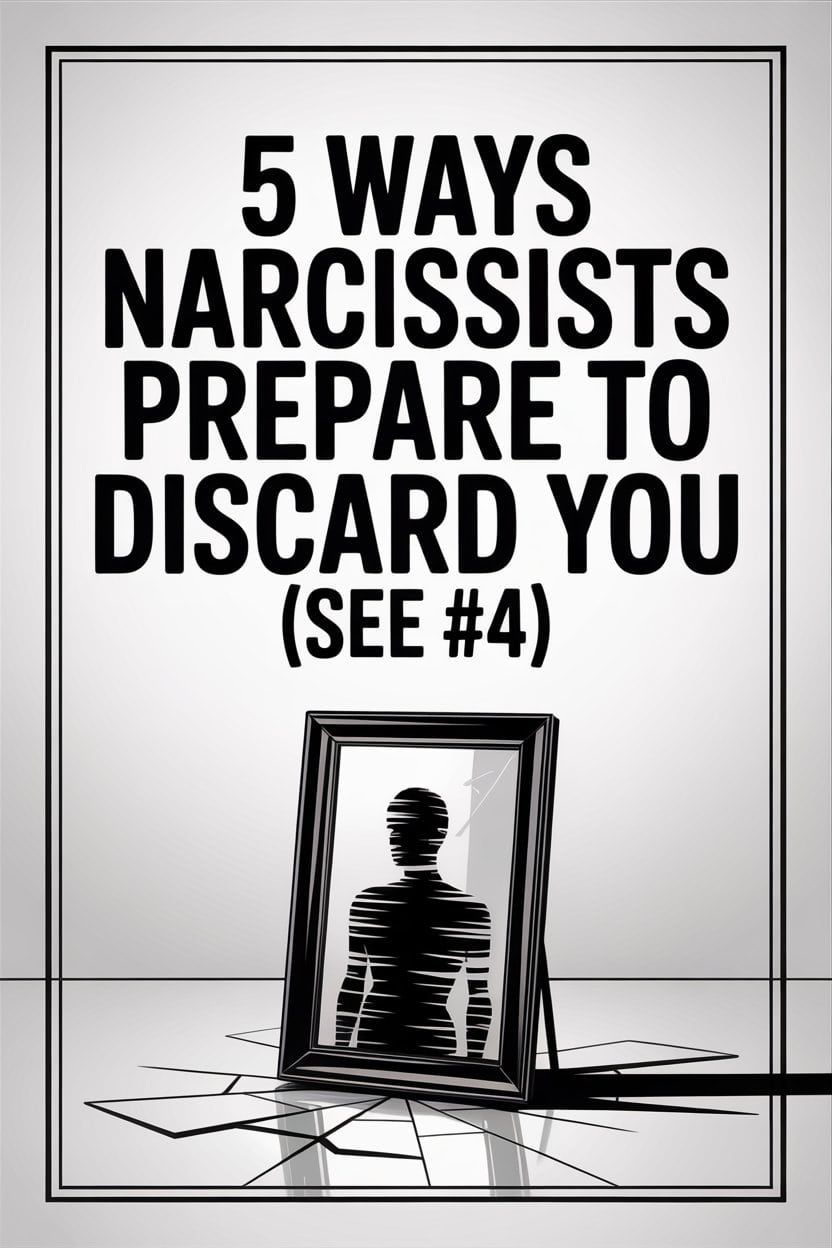Ah, the narcissist. Equal parts charming, infuriating, and, let’s be honest, about as emotionally stable as a squirrel on an espresso bender.
They sweep in with grand gestures and dazzling promises, making you wonder if you’ve finally stumbled into your very own romantic comedy—until the script flips and you’re left feeling like the punchline.
If you’re reading this, chances are you’re starting to notice the plot holes.
Narcissists don’t just wake up one day, snap their fingers, and vanish. No, they’re all about the drama, the build-up, and the not-so-subtle signals that they’re ready to move on (usually to an audience of one: themselves).
So, if your gut’s been whispering that something’s off, you’re probably right. Here are five ways narcissists prepare to discard you—especially #4, which packs a wallop.
1. The Sudden Shift from Idealization to Irritation
During the “honeymoon” phase, narcissists treat you like the second coming of Beyoncé and Einstein rolled into one. You’re showered with compliments, affection, and possibly more texts than a teenager with unlimited data.
Then, one day, you can practically feel the temperature drop. The same quirks they once called “adorable” become ammunition in petty arguments.
Your laugh? Now it’s “too loud.” Your favorite pizza topping? “How could anyone eat that?” A narcissist’s affection cools quickly when they start hunting for reasons to justify their next exit.
If you feel like you’re walking on eggshells—careful not to trigger another eye roll or sigh—something’s brewing.
This shift isn’t random; it’s the narcissist’s not-so-subtle way of priming you for rejection, all while keeping their hands clean. You change, not them. (Or so they’d like you to think.)
2. The Great Gaslight Gala
Narcissists adore a bit of mental gymnastics. Before making their dramatic exit, they crank up the gaslighting. Suddenly, you’re “too sensitive,” “imagining things,” or “overreacting—again.”
Caught them in a lie? Apparently, you remembered it wrong. Upset they canceled plans for the fourth time? They’ll remind you how “needy” you’ve become.
This isn’t just about winning arguments. It’s training you to doubt your perceptions and blame yourself for the growing distance.
This tactic is as old as time (or at least as old as reality TV dating shows). By making you question your own sanity, the narcissist sets the stage for their departure—after all, who could possibly tolerate someone so “unstable”?
Spoiler: it’s not you. It’s them. Always has been.
3. Collecting New Supplies
Narcissists have a sixth sense for sniffing out fresh sources of admiration. Long before you spot trouble, they’re already networking—flirting with the barista, charming the group chat, or “accidentally” reconnecting with old flames on social media.
If your partner’s suddenly glued to their phone, posting thirst traps, or keeps mentioning a mysterious “work friend,” don’t brush it off.
They’re laying the groundwork for a seamless transition, often lining up the next relationship before ending yours. This is less about romance and more about never having to sit with their own emptiness.
Don’t be surprised if their exit is immediately followed by a soft-launch of their new “soulmate.” The timeline will make your head spin. (Trust, it’s not a coincidence.)
4. Rewriting the Relationship History
Here’s where the narcissist’s Oscar-worthy performance really takes the stage. When preparing to discard you, they begin rewriting your shared story—often loudly and to anyone who’ll listen.
Suddenly, every argument was “your fault.” Every happy memory is minimized, and any sign of trouble is exaggerated beyond belief.
They’ll vent to friends, family, even your mutual dog walker, painting themselves as the innocent victim trapped in a relationship with a monster (that’s you, apparently).
The goal? To secure sympathy, validation, and, frankly, backup for when the inevitable breakup happens.
Why does this matter so much? Because a narcissist’s public image is everything. They’re not content to move on quietly—they need an audience to assure them that they did the right thing.
If you catch wind of these creative rewrites, don’t waste your breath defending yourself to their peanut gallery. Anyone who knows you won’t buy the drama.
5. The Emotional Vanishing Act
The final act is less a bang and more a slow fade, like a soap opera character walking off-screen to “find themselves.” Emotional withdrawal is the narcissist’s way of making the breakup feel like your idea, or at least a mutual drift.
They stop sharing details about their day. Physical affection dries up. Conversations become transactional, if they happen at all.
Suddenly, you’re living with a roommate who only emerges to criticize your snack choices or ask if you paid the Wi-Fi bill.
This emotional vacancy serves two purposes: it punishes you (how dare you expect basic kindness?) and prepares them to step into their next role without baggage.
No messy tears for them—just a brisk walk into the sunset, leaving you wondering how you went from “love of their life” to an afterthought.
Spotting the Exit Signs (And What to Do About Them)
If these warning signs are sounding painfully familiar, it’s not because you’re “too sensitive.” Narcissists follow these patterns with unnerving precision.
The trick isn’t to outplay them (good luck with that) but to recognize their moves early and decide how you want to respond.
Lean on people who have your back. Document the stories you want to remember and keep them close. Trust your gut—if something feels off, it probably is.
Setting boundaries and preparing for your own exit might feel daunting, but it’s the bravest thing you can do.
And if you need to, take comfort in knowing you’re not alone in this absurd little circus.
Here’s the silver lining: the discard phase isn’t a reflection of your worth. It’s a neon sign pointing to their emptiness, not yours.
Your story continues well after the narcissist’s dramatic exit—and you get to write the next chapter, drama optional.


